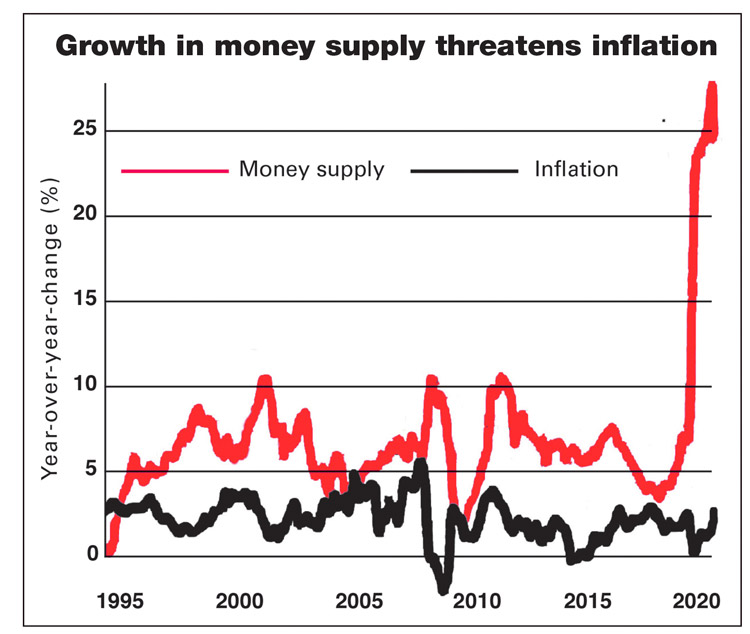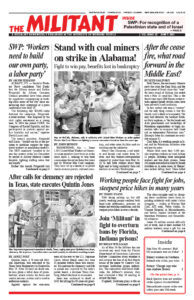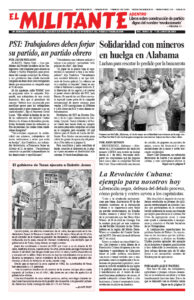With hiring picking up, but still slowly, working people confront both large-scale joblessness, pressure on wages and working conditions, and the steepest price hikes in over a decade.
The class-struggle road to changing these conditions starts from expanding solidarity with today’s labor struggles — strikes at Warrior Met Coal, ATI steel, Volvo trucks, St. Vincent Hospital in Massachusetts, and battles against lockouts at the Marathon Petroleum and ExxonMobil refineries.

Some 16 million remain officially out of work, and at least another 6.6 million workers want a job but are “discouraged,” as the bosses put it, and have stopped looking for work over the past four weeks.
Competition for jobs is aggravated by a sharp rise in inflation, officially 4.2%. But that figure masks the true impact on working people, because basic necessities, a big proportion of our monthly expenditures, are rising at a much faster pace. Meat prices rose 5.5% through 2020, pan white bread went up 13% between January 2020 and this April, and gas prices are the highest since 2015.
Used car prices soared 10% last month, as workers who can no longer afford to get a new car search for a ride.
Over two decades ago President Bill Clinton helped bosses fake the real extent of cost-of-living increases bearing down on us. They rejiggered the way the Consumer Price Index is calculated to exclude essential items whose prices were rising the fastest. For instance, when steak goes up, they say, working people substitute hamburger. So they replaced steak as an item in the CPI with ground beef. Shazam! No inflation.
Federal Reserve Chairman Jerome Powell says don’t worry, the price increases are only “transitory.” Some commentators in the bosses’ press even tell us inflation is necessary to lubricate the wheels of the capitalist recovery. These middle-class commentators believe in their heart that higher profits for the bosses is the only way forward and the ruinous impact that even small price rises have on workers’ lives is just something we have to live with.
New York Times economics correspondent Neil Irwin says restaurant owners blame price rises on workers who insist on better pay to come back to work after months of shutdowns and unemployment. McDonald’s says that to expand hiring it will raise wages for 36,500 workers at its company-owned stores, but not at its franchise operations, which include the large majority of the hamburger emporium’s workers.
Some bosses are fighting to keep wages down as they gear up for more hiring by offering one-time signing bonuses that do nothing to protect us from the ravages of inflation.
Wage rises don’t create inflation
The myth that high prices are caused by workers’ wage demands is used by bosses to try to pit us against fellow workers who they call “consumers” to weaken our fighting capacity. But successful wage fights only allow workers to win a higher percentage of the wealth our labor produces.
Inflation isn’t caused by workers winning pay hikes. It occurs when “the purchasing power of a national currency declines,” writes Jack Barnes, Socialist Workers Party national secretary, in New International no. 10.
This is especially true today as capitalist rulers in Washington and elsewhere are printing money and raising their governments’ national debt like there’s no tomorrow, claiming it doesn’t matter. At the same time, the International Monetary Fund, run by those same governments, impose onerous “austerity” budgets on semi-colonial countries that try to do the exact same thing.
“Governments and banks crank out money in various paper forms, eventually far outstripping the output of commodities that could be purchased with that money,” Barnes says. This feeds inflation.
Short of taking political power into our own hands, there is no way for workers to prevent periodic bouts of inflation under capitalism. But by organizing to build unions and fighting together for higher pay and escalator clauses in our contracts, we can protect our living standards.
“That’s why each of the labor struggles taking place today sets an example for millions of other workers,” Rebecca Williamson, Socialist Workers Party candidate for Seattle City Council, told the Militant. Williamson and her co-workers at a Walmart store organized a solidarity collection for locked-out Marathon oil refinery workers in St. Paul Park, Minnesota.
“The SWP urges workers and our unions to fight for a sliding scale of wages and hours. Thirty hours work for 40 hours pay to share the work available around! And for cost-of-living adjustments in every contract, in our retirement benefits and in Social Security to offset every price increase,” she said.
Big grocery store and retail chain owners are looking to protect their profits from the effect of price rises on their sales. They expect customers will be looking for cheaper alternatives to brand names and are expanding the range of generic goods they produce. Bosses at Whole Foods have increased their “365” brand line to 3,000 products since it was introduced two years ago.
In the face of the global slowdown in production and trade, many capitalist governments have devalued their currencies, seeking to defend their own bankers and bosses against foreign competition by making imports more expensive. At the same time, massive unemployment continues to bear down. Millions of working people are being squeezed as prices of essential goods soar. Many have been forced to cut meat and fruit from their diet and eat less nutritious but cheaper food.
In Pakistan the price of chicken has risen 85% over the last year. Imported rice rose 60% in Sierra Leone after the value of country’s currency plunged.
These conditions are driving working people to take action to defend themselves. “No to high prices! Not to hunger!” chanted protesters in Nyala, Sudan, as they and others in cities across the country took to the streets to protest a sharp rise in bread prices earlier this year.
“The road forward is for working people to break with the bosses’ parties,” SWP candidate Williamson said “The Democrats and Republicans do the bidding of the ruling capitalist families. Workers need to build fighting unions and our own political party, a labor party. We need to organize in our millions to take political power into our own hands and establish a workers and farmers government.”

